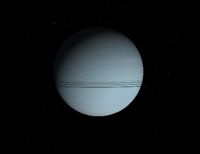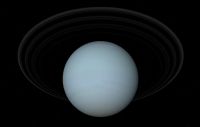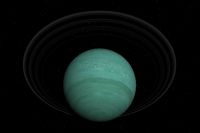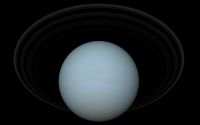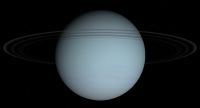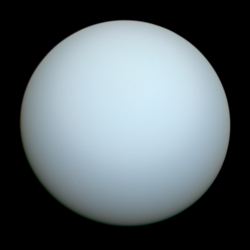 | This article, about a planet, is a stub. You can help Orbiterwiki by expanding it.
| Uranus
|
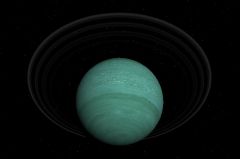
|
| Uranus in Orbiter
|
| Designation
|
| Name |
Uranus
|
| Reference body |
Sun
|
| Number of satellites |
|
| Planetary mean orbits
|
| Epoch |
J2000 (1 January 2000)
|
| Semimajor axis (a) |
2.87097222×1012 m (19.19126393 AU)
|
| Eccentricity (e) |
0.04716771
|
| Inclination (i) |
0.76986°
(0.01343659 radian)
|
| Longitude of the ascending node (LAN, ☊) |
74.22988°
(1.295558 radian)
|
| Longitude of periapsis (ϖ) |
170.96424°
(2.983889 radian)
|
| Mean longitude (L) |
313.23218°
(5.4669329 radian)
|
| Planetary orbital element centennial rates
|
| Semimajor axis (a) |
0.00152025 AU/Century
|
| Eccentricity (e) |
-0.00019150 Century-1
|
| Inclination (i) |
-2.09 seconds/Century
|
| Longitude of the ascending node (LAN, ☊) |
-1681.40 seconds/Century
|
| Longitude of periapsis (ϖ) |
1312.56 seconds/Century
|
| Mean longitude (L) |
1542547.79 seconds/Century
|
| Selected physical parameters
|
| Mean radius |
25362.0±12 km
|
| Mass |
8.6832054×1025 kg
|
| Density |
1.318 g/cm3
|
| Sidereal rotation period |
-62064 (retrograde) (17.24±0.01 hours)
|
| Obliquity|align="right" width="30%"|1.4346
|
| LAN|align="right" width="30%"|2.9255
|
| Sidereal orbit period |
83.747407 years
|
| Magnitude V(1,0) |
-7.19
|
| Geometric albedo |
0.51
|
| Equatorial gravity |
8.69±0.001 m/s2
|
| Escape velocity |
21.3 km/s
|
| Rotation elements
|
| North pole right ascension (α) |
259.29°
|
| North pole declination (δ) |
-15.09°
|
| Obliqutiy of ecliptic |
82.19°
|
| Longitude of Sun's transit |
167.62°
|
| Atmospheric parameters
|
| Surface Pressure |
>>104 kPa
|
| Surface Density |
~0.42 kg/m3 at 1 bar
|
| Scale height |
27.7 km
|
| Average temperature |
~58 K
|
| Wind speeds |
0.200 m/s
|
| Ecliptic position from primary*
|
| Note |
*Elements given are from Orbiter.pdf (2016)
|
Uranus is the 7th planet from the Sun, the third largest in diameter, and the fourth largest in mass. The planet boasts a ring system and 28 known satellites. William Herschel discovered Uranus on 13 March 1781, although he thought it was a comet for some time. Later, it was realized that it was observed several times by others, but, not recognized as a planet. It is just barely visible in a dark sky. Uranus is unique in that the polar axis is tilted some 97° to it's orbit.
Uranus in Orbiter
Uranus has been a part of Orbiter since the beginning with the release of Orbiter 2001. In Orbiter 2002, the orbital parameters of Uranus was moved to Vsop87.dll. The add-on uranus.zip included storm patterns on the Uranus visuals.
| Orbiter versions and add-ons which include Uranus
|
| Add-on |
Source |
Version |
Author |
Type |
Release Date |
Compatibility |
Wiki article
|
| 2005 (with P1 patch files) |
O-F Resources |
050216 |
martins |
Orbiter Download |
16 February 2005 |
Orbiter 2005 |
|
| Orbiter 2003-P2 |
O-F Resources |
031217 |
martins |
Orbiter Download |
17 December 2003 |
Orbiter 2003-P2 |
|
| Orbiter 2003-P1 |
O-F Resources |
031105 |
martins |
Orbiter Download |
5 November 2003 |
|
| Uranus-Neptune II |
AVSIM |
|
Rolf B Keibel |
Scenery |
6 March 2003 |
|
|
| Uranus |
AVSIM |
|
Rolf Keibel |
Scenery |
5 November 2002 |
|
|
| Orbiter 2002 |
O-F Resources |
020419 |
martins |
Orbiter Download |
19 April 2002 |
Orbiter 2002 |
|
| Orbiter 2001 |
O-F Resources |
010503 |
martins |
Orbiter Download |
3 May 2001 |
Orbiter 2001 |
|
See also
Uranus at Wikipedia
Uranus with Storms from uranus.zip installed
Uranus as seen by the Voyager 2 spacecraft on 23 January 1986
from Wikimedia Commons
|


